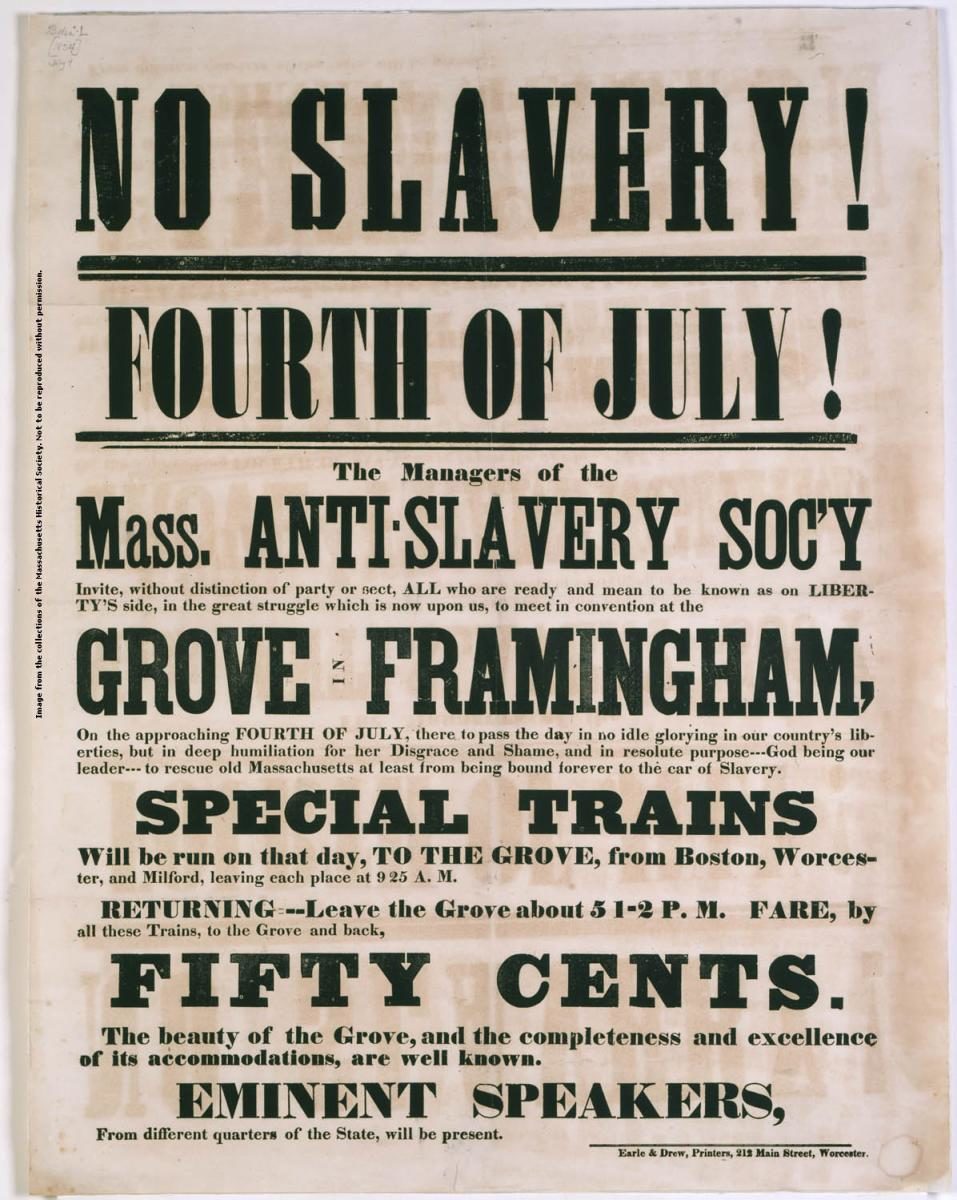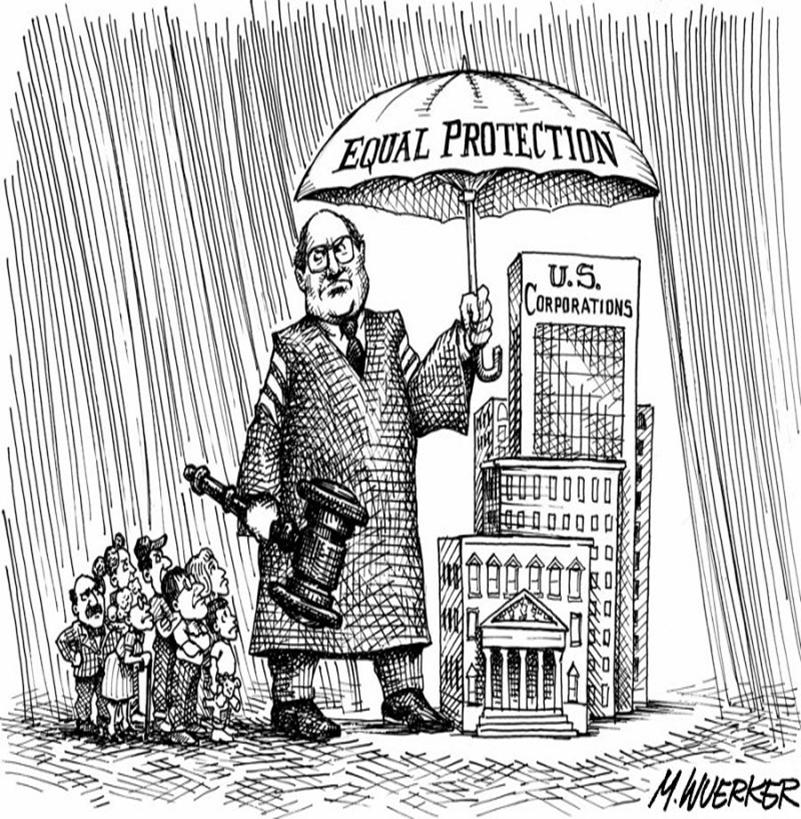As I spend time with family in the Boston area, I’m no more than a mile away from what was once known as “Harmony Grove,” where the Massachusetts Anti-Slavery Society celebrated the Fourth of July with picnics and rallies for over twenty years – from 1846 to 1865.
Later this week, we’re going to try to find the very spot in 1854 where William Lloyd Garrison, one of the nation’s leading abolitionist voices, held up a copy of the U.S. Constitution and lit it on fire. Notably, it wasn’t the first time that the Abolitionists had burned the Constitution. In fact, they openly referred to it as a “covenant with death.”

Harmony House Massachusetts Antislavery Society Broadside
A Slavery Constitution
The Garrisonians believed that a nation governed by the Constitution could never be free, because it protected the institution of slavery. As evidence, they pointed to the clause counting slaves as three-fifths of a person for representation, which allowed the southern states to outvote northern ones in the House. Under the Electoral College, that same scheme of representation delivered the presidency to southern candidates in almost all presidential elections for a span of seventy-five years.
As well, Garrisonians pointed to constitutional provisions that required fleeing slaves to be “delivered up” to slaveowners, banned the prohibition of the slave trade for over a decade, and pledged the federal government’s backing for the quelling of slave insurrections.
Frozen in a constitutional system that is morally and ethically wrong, you have a choice – you can either change it from within, or you can leave that system.
They believed, and rightly so, that traditional politics in that age – electing the right people to make anti-slavery laws – was useless. They lived in a nation where the very source code of the country guaranteed the continuance of a “slave state,” and that source code could be used to override anti-slavery laws.
Logically, then, they called for the North to secede from the South, and to write its own Constitution. A freedom Constitution.
A Choice to Secede
Frozen in a constitutional system that is morally and ethically wrong, you have a choice – you can either change it from within, or you can leave that system. Changing it from within wasn’t an option for the Garrisonians. Amendments to the Constitution were held within the power of the numerically superior southern states to veto. Thus, they called for the North to secede.
Looking in the direction of Harmony Grove, I am reminded of the parallels between Garrison’s time and our own.
The Corporate State
Instead of a “slave state,” today, we have a corporate one. Indeed, it is difficult to tell our own government apart from the largest corporations that now control agriculture, transportation, waste management, marketing, and even the pathways we use to communicate with each other.
Corporate actors are too smart to allow their futures to be controlled by the most recently elected politician or most recently enacted law. And so, over the past century, they have turned to the Constitution to provide themselves with the strongest protections against both. Corporations now possess most of the same constitutional rights as you or me. Further, they are shielded by specific provisions of the Constitution, such as the commerce clause, against laws that seek to deny corporate wants.

Matt Wuerker
If your community tries to ban a corporate factory farm, or a natural gas pipeline, or a fracking well, corporate attorneys file a lawsuit asserting corporate constitutional “rights” against your city, town, village, or county. They overturn the law, and may also seek millions of dollars in damages – amounts equal to the cost to the corporation of the delayed project.
In addition to using the courts to enforce corporate constitutional “rights,” corporations and their lobbyists have worked tirelessly to limit what laws your community can, and cannot, pass. Not surprisingly, state legislatures have worked hand-in-hand with agribusiness corporations to prohibit municipalities from banning the use of genetically modified seeds, and gas corporations to prohibit communities from banning fracking and fossil fuel extraction.
If we can’t stop the extraction of fossil fuels, we become forced conspirators to the cooking of the planet. If we can’t stop corporate factory farms, we are impressed into the machine forcing family farmers off the farm. If we can’t stop big box stores, we are partially to blame for collapsing downtowns.
Our communities can be used, at any time, without our consent. In many ways, we’ve become unwilling instruments of our own oppression.
We have become slaves of a different kind.
What If?
We can talk about the need to elect better politicians and make better laws, but in the end, we find ourselves in the same place at the Garrisonians. Like them, we are stuck in a system where engaging in conventional politics is pointless, because those measures can be wiped out on a whim.
What if the North had seceded from the South? Would we celebrate the spirit of seceding for a noble purpose, in the name of freedom? Or would we continue to treat secession as a four letter word?
What if our cities, towns, and counties – caught in the predictable undertow of corporate “rights”– seceded to get out from underneath the unholy alliance that has formed between corporations and our governments?
What if the only way to build a sustainability constitution is to break the one that we have?
At places like Harmony Grove, the Abolitionists asked themselves similar questions. Perhaps it is time to ask our own.
CELDF is leading the way to challenge corporate claimed “rights” that interfere with communities’ democratic and environmental rights. We have assisted nearly 200 communities to ban shale gas drilling and fracking, factory farming, water privatization, and other harms. This includes eliminating corporate “rights” when they violate community and nature’s rights. We have helped the first communities in the country to elevate the rights of communities above the “rights” of corporations.
Our work depends on your contribution! Help us grow Community Rights and support our partner communities. Please donate today!
